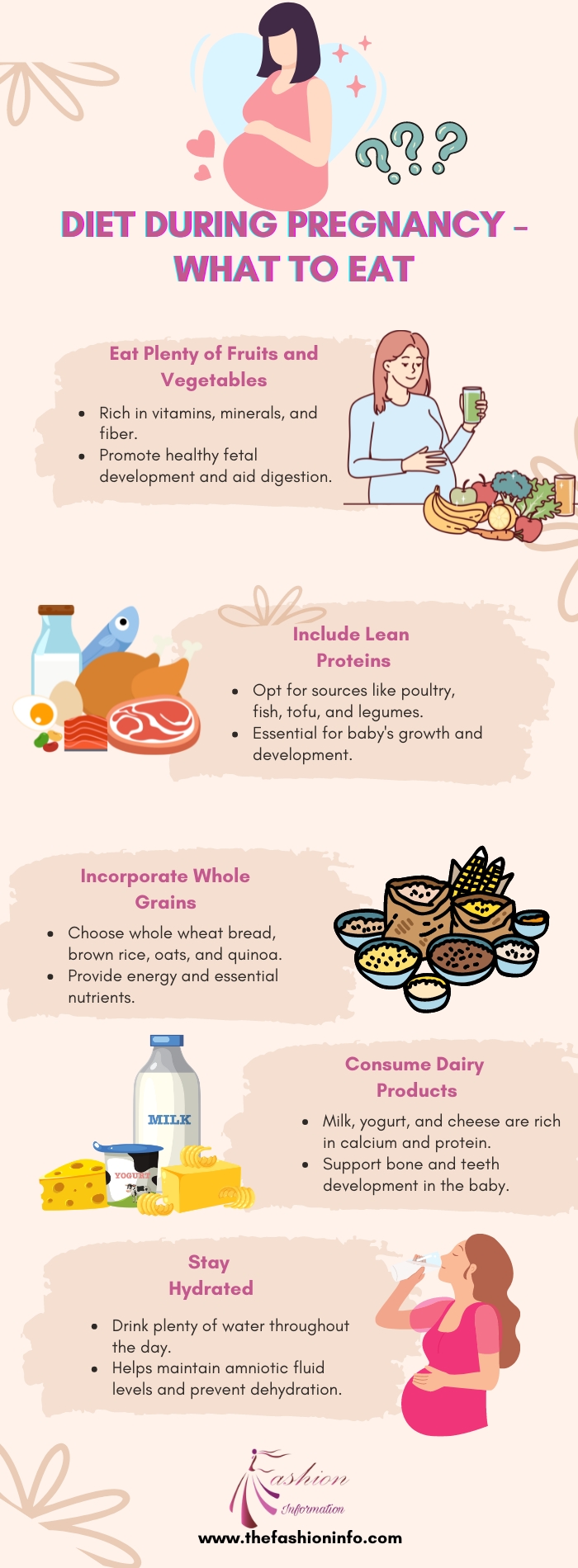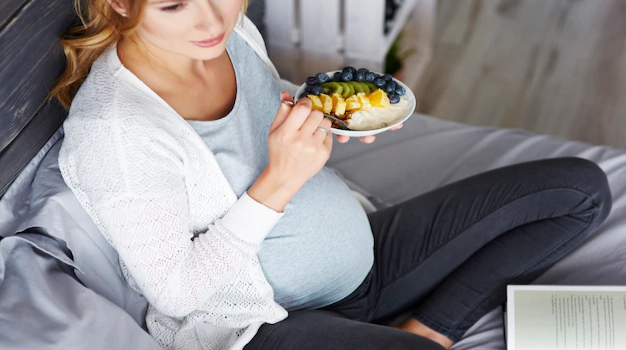Table of Contents
Introduction To Diet During Pregnancy
Diet During Pregnancy: Pregnancy is a time to celebrate the wonders of life. But it’s also a time of worry because you’re carrying another human being. And because every baby is unique, your pregnancy should be different than anyone else’s. To help you through this exciting yet difficult time, we’ve put together a simple guide to the best foods to eat during pregnancy and why they’re important.
What Is The Best Dite During Pregnancy Woman
1.Foods Are Rich In Iron
Iron forms red blood cells. This is essential for pregnant women as it helps the child develop. Fatigue can result from the body having low iron levels. Iron-rich foods include beef, pork, chicken, turkey, fish, beans (also called legumes), lentils, tofu, spinach, broccoli, nuts, and seeds (almonds or cashews, raisins, dark chocolate). It is included. Hypoglycemia may be the culprit if you feel tired even after eating a healthy meal. Eat small meals every 2-3 hours or drink juice instead of soda or coffee. Prize. Your baby needs to eat (every 2-3 hours) so that his body can produce enough milk.
2.Food Is Rich In Calcium
A sufficient amount of calcium for pregnant women is 500 mg per day.Rich in Calcium helps strengthen and develop your baby’s bones and teeth and the entire skeletal system.
Foods rich in calcium include:
- Calcium-fortified juices such as orange juice or soy milk
- Dairy products such as skim milk and yogurt (high in calcium)
- canned salmon with bone
3.Food Is Rich In Protein
For pregnant women’s health and well-being, protein-rich diets are crucial. Proteins are important building blocks of the body made up of amino acids. Our bodies use these amino acids to build and repair new cells and tissues. Protein also plays a role in maintaining a healthy immune system, aids digestion and metabolism, and supports brain development diet during pregnancy!
Protein is found in many foods, from lean meats such as salmon and chicken breast to legumes (especially soybeans), eggs (which contain an omega-3 fatty acid called DHA), nuts, seeds, dairy, tofu, and soy milk. It contains
4.High-Fiber Foods Diet During Pregnancy
High-fiber foods are a great way to ensure you’re getting enough fiber. Fiber is important for digestion and helps prevent constipation, which can cause gas and bloat. Dietary fiber also helps you feel fuller for longer. This can help you eat less overall. Burn for your body!
- The effect of fiber on cholesterol levels is particularly noteworthy.
- Decreases blood levels of LDL (bad) cholesterol.
- It promotes cardiovascular health by increasing HDL (good) cholesterol, reducing inflammation, and lowering high blood pressure.
- Improves blood circulation throughout the body.
When absorbing water, soluble fibre behaves like a sponge. during digestion, preventing constipation.
5.Foods Are Rich In Zinc
Zinc is important for healthy skin, hair, and wound healing. Zinc is found in whole grains (rich in zinc) such as oysters, beef, lamb, beans, wheat germ, nuts, and seeds, all of which are excellent sources.
6.Foods Are Rich In Vitamin C
Vitamin C is important for both mother and baby as it reduces the risk of pregnancy complications, boosts immunity, and helps tissue repair. It is necessary for the development of the baby’s teeth and bones.
Foods rich in vitamin C include:
- Citrus fruits such as oranges and grapefruit.
- Tomatoes.
- Broccoli and other cruciferous vegetables (cauliflower, cabbage).
- Peppers (red peppers, orange peppers).
A soluble fibre absorbs liquid like a sponge. such as spinach and chard.
7.Foods Are Rich In Folic Acid/Folic Acid.
Folate is a synthetic form of folate, a B vitamin that helps a baby’s brain and spinal cord develop. This helps prevent congenital disabilities but also helps reduce the risk of neural tube defects (a type of congenital disability in which part or all of the spine does not close properly). Folic acid (also called folic acid) is a form of folate in food.
Dark green vegetables are among the foods high in folic acid. (broccoli, Brussels sprouts), beans (lentils), nuts, and dried fruits such as raisins and oranges.
8.Healthy Fats And Oils
Fat is important for pregnant women because it helps produce hormones and provides energy. Healthy fats are essential for properly developing your baby’s brain and eyes.
There are two types of fat to watch out for during pregnancy:
- crowded
- unsaturated
Saturated fats, also called “bad” fats, are solid at room temperature and can raise blood cholesterol levels. Unsaturated fats are good healthy fats, like omega-3s, that help build your baby’s brain and nervous system. Unsaturated fats are liquid at room temperature and help lower LDL (low-density lipoprotein) cholesterol levels in the blood. If you want to eat more unsaturated foods during pregnancy, choose foods that contain monounsaturated or polyunsaturated fats (PUFAs) instead of PUFA + SFA combinations like olive oil and coconut oil.
9.Diet During Pregnancy : Liquid
Hydration is important for pregnant women, but it’s important to remember that your weight and activity level determine how much water you need.
Hydration during pregnancy is important for the formation of amniotic fluid, the production of extra blood, the construction of new tissue, the transport of nutrients, the aid of digestion, and the elimination of waste and toxins.
If you’re thirsty, you’re already dehydrated, so don’t drink soda or sugary drinks until you’re thirsty. If the water doesn’t go away after an hour or two, call your doctor for advice on how much water you should drink at that time of day (or night).
Indian Foods To Avoid Diet During Pregnancy
These are some of the most frequent occurrences. to avoid diet during pregnancy.
1.Alcohol
Alcohol consumption during pregnancy can lead to a number of issues. It can cause congenital disabilities, miscarriages, and low birth weight in babies.
Avoid drinking alcohol during pregnancy, as it can affect your baby’s development. If you decide to drink alcohol during pregnancy, talk to your prenatal doctor about safe amounts and ways to limit your time with other people who drink.
2.Caffeine
As a stimulant, caffeine has the potential to induce nervousness, insomnia, and heartburn. It has also been linked to miscarriages, low birth weight, and premature birth. Researchers have also found that caffeine can increase the risk of behavioral problems in children.
3.Unpasteurized Soft Cheese
Raw soft cheese is made from raw milk, which may contain listeria. The United States Food and Drug Administration claims that (FDA), this bacterium is the main culprit behind foodborne disease in the US. If you are pregnant or planning to have a baby, be aware that eating unpasteurized cheese can put your health at risk. Listeria infection during pregnancy can even lead to complications such as miscarriage or stillbirth.
If you’re thinking about eating soft cheeses during pregnancy, talk to your doctor first about their safety during pregnancy and how much you should eat at one time before eating them to determine if they’re good for you or your baby for your health.
4.A Fish Avoid Diet During Pregnancy
Fish contains mercury, a heavy metal that can affect a developing baby’s nervous system. Certain fish, including sharks, swordfish, and king mackerel, contain mercury.
During pregnancy, it’s important to eat foods that provide your body with all the nutrients it needs to grow a healthy baby. If you are pregnant and want to avoid certain foods during this period, talk to your doctor about how much fish you should eat each week.
5.A Few Walnuts
Avoid peanuts, cashews, and uncooked nuts. These foods are a common cause of food allergies in children.Cashews can be a choking hazard for babies, so avoid them during pregnancy.
Nuts such as almonds, Brazil nuts, and pistachios are allergens (meaning they cause your body to make antibodies against them).
6.Raw Sprouts
Raw sprouts are a common source of food poisoning. Avoid these natural foods, as well as any other raw vegetables you can’t cook yourself:
- Avoid raw cabbage and lettuce, which can cause vomiting and diarrhea if eaten in large quantities.
- Cook all kinds of bean sprouts until they are soft (but not mushy). This kills any harmful bacteria and makes them safe to use.
Store cooked bean sprouts in the fridge or freezer so they can last more than a day before you open the bag again. However, it is always recommended that you cook your seeds instead of buying them ready-made at the store, as additional ingredients may be added during production that may make them unsuitable for consumption by anyone but those with allergies or sensitivities.
While these lists are by no means exhaustive, they include some of the most common and well-known foods to avoid during pregnancy. And remember, whether or not you eat anything on this listdepends on you and what is healthiest for your body.
The above are some of the most common foods to avoid during pregnancy; everybody is different, so it is always recommended that you follow the diet prescribed by your doctor. If you are looking for the best guidance for your pregnancy, you can schedule an appointment at Srinagar IVF Clinic.
Conclusion
The most important thing to remember is to eat a healthy diet when you are pregnant. This will help you carry a healthy baby and give your body the nutrients it needs for motherhood. A balanced diet is important, even if you have no health problems, because it can prevent nutrient deficiencies and ensure that adequate amounts of vitamins, minerals, and other nutrients are available to mother and baby after birth.
Infographic: Diet During Pregnancy What to Eat


